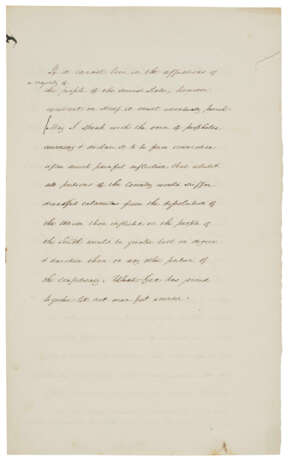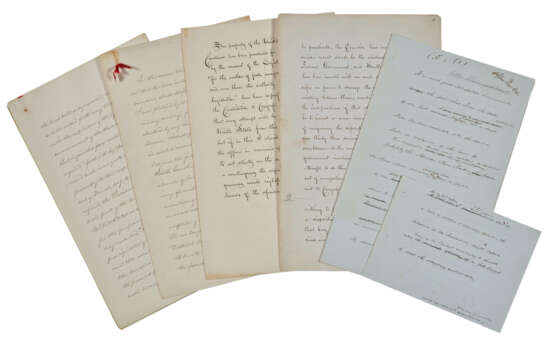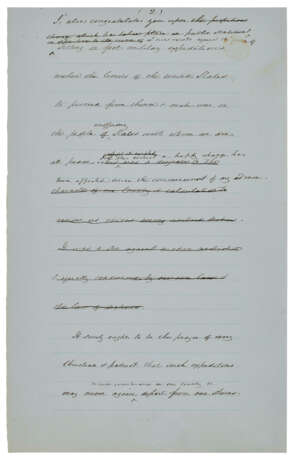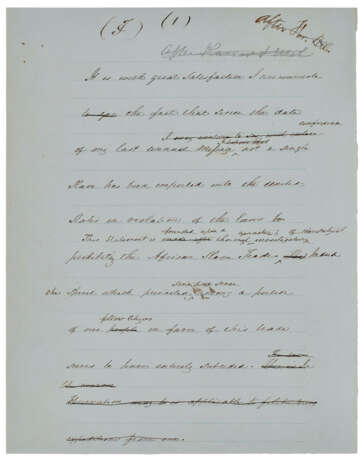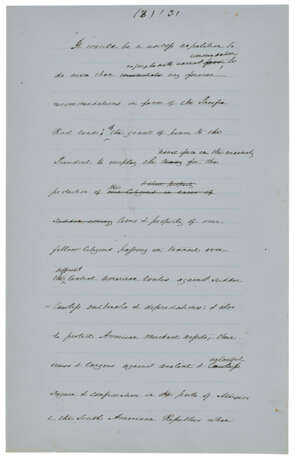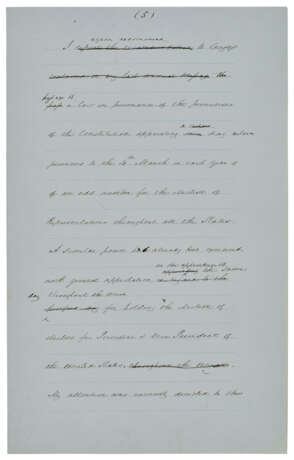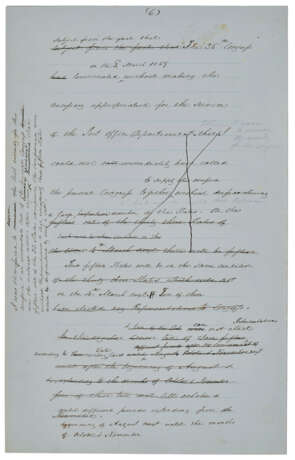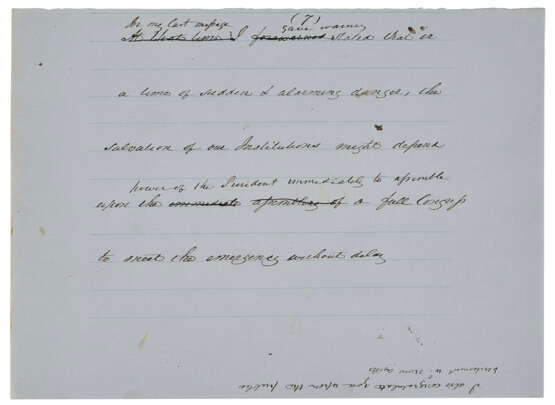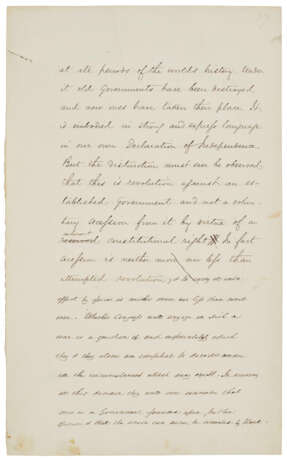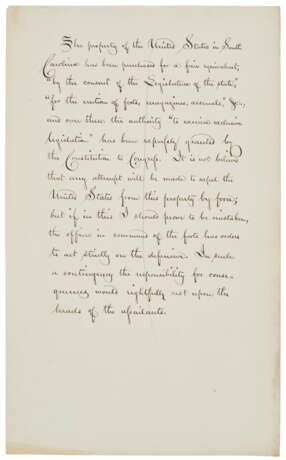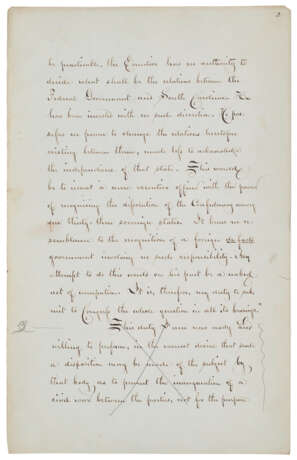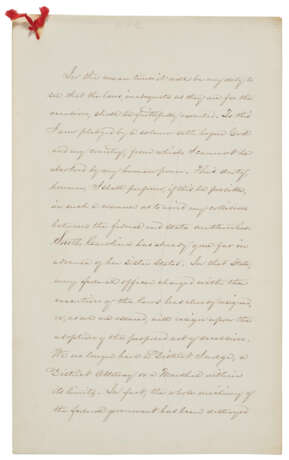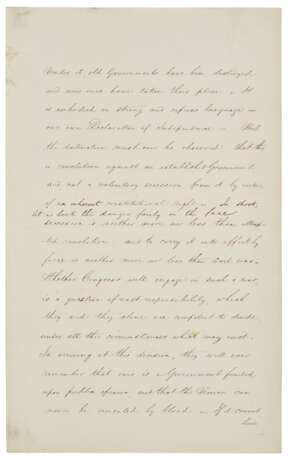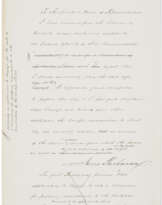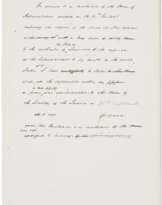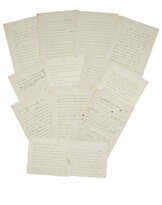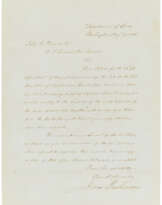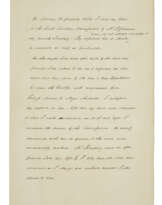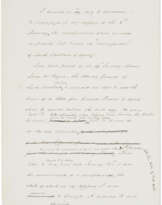ID 1119243
Lot 140 | Denouncing secession and warning of the calamity of civil war
Estimate value
$ 120 000 – 180 000
James Buchanan, November/December 1860
BUCHANAN, James. (1791-1868); GLOSSBRENNER, Adam John (1810-1889), et al. Autograph manuscript, a portion of his State of the Union Message, [Washington, late November - early December 1860].
20 pages, various sizes ranging from 150 x 205mm to 347 x 213mm. Eight pages in Buchanan's hand, two in the hand of his private secretary, Adam John GLOSBRENNER (1810-1889) and the remainder an unidentified hand, with penciled and inked corrections throughout with heavy emendations and corrections in the pages written by Buchanan. Several leaves partly joined with a red ribbon, the balance loose (light soiling and occasional tears at margins not affecting text).
"'What God has joined together, let not man put asunder.'"
Highly important draft portions of James Buchanan's final State of the Union message delivered as South Carolina delegates assembled for a convention in Charleston to consider secession from the Union: "…this is a revolution against an established government and not a voluntary secession from it by virtue of an inherent constitutional right. In fact secession is neither more nor less than attempted revolution; & to carry it into effect by force is neither more nor less than civil war." An intimate look into the painstaking construction of James Buchanan’s final State of the Union message, delivered to Congress on the eve of South Carolina’s secession from the Union. The draft covers some of the most critical portions of Buchanan's speech: the looming secession crisis and his plans on how best to manage it. "In the meantime it will be my duty to see that the laws, inadequate as they are for the occasion, shall be faithfully executed. To this I am pledged by a solemn oath before God and my country, from which I can not be absolved by any human power. This duty, however, I shall perform, if this be possible, in such a manner as to avoid any collision between the federal and state authorities." But the problem was seemingly intractable: "South Carolina has already gone far in advance of her sister states. In that state every federal officer charged with the execution of the laws has already resigned, or, as we are assured, will resign upon the adoption of the proposed act of secession. We no longer have a district judge, a district attorney, or a marshal in South Carolina. In fact, the whole machinery of the Federal Government necessary for the distribution of remedial justice among the people has been demolished, and it would be difficult, if not impossible to replace it." Buchanan cautioned that the executive was essentially powerless to compel the state to remain within the Union, and it was up to Congress to act as the laws that were currently on the books were inadequate to the task: "May I speak with the voice of prophetic warning, and declare it to be my firm conviction after much painful reflection, that whilst all portions of the country would suffer dreadful calamities from the dissolution of the Union those inflicted on the people of the South would be greater both in degree and duration than any other portion of the Confederacy. 'What God has joined together, let not man put asunder.'"
Ironically, the first numbered page begins with an assessment of the nation's success in suppressing the slave trade: "It is with great satisfaction I communicate the fact that since the date of my last annual message not a single slave has been imported into the United States in violation of the laws prohibiting the African slave trade." The passage eventually found its way to follow Buchanan's statements regarding the federal budget, though a pair of crossed-out notes at the top of the page indicate that Glossbrenner had suggested it be inserted "After For[eign] Rel[ations]", while Buchanan thought it be placed "After Kansas and Utah".
Manuscript drafts of any Presidential State of the Union message seldom appear at auction. RBH records a precious few examples: most notably a draft page of Abraham Lincoln's final State of the Union message and the opening passage of Grover Cleveland's delivered in 1885. The final text was published in John Basset More, ed., The Works of James Buchanan. Philadelphia & London: J. B. Lippincott Company, 1910. Vol. 11, pp. 7-43.
| Artist: | Adam John Glossbrenner (1810 - 1889) James Buchanan (1791 - 1868) |
|---|---|
| Auction house category: | Letters, documents and manuscripts |
| Artist: | Adam John Glossbrenner (1810 - 1889) James Buchanan (1791 - 1868) |
|---|---|
| Auction house category: | Letters, documents and manuscripts |
| Address of auction |
CHRISTIE'S 20 Rockefeller Plaza 10020 New York USA | ||||||||||||||
|---|---|---|---|---|---|---|---|---|---|---|---|---|---|---|---|
| Preview |
| ||||||||||||||
| Phone | +1 212 636 2000 | ||||||||||||||
| Fax | +1 212 636 4930 | ||||||||||||||
| Conditions of purchase | Conditions of purchase | ||||||||||||||
| Shipping |
Postal service Courier service pickup by yourself | ||||||||||||||
| Payment methods |
Wire Transfer | ||||||||||||||
| Business hours | Business hours
|
